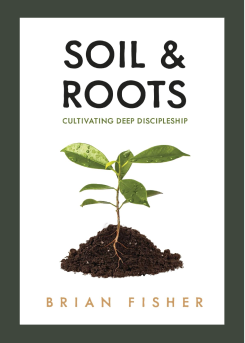Thanks for joining me this week as we explore deep discipleship, and welcome to all our new subscribers. Great to have you with us!
Onward to Intimacy
We are working our way through the Five Elements of Spiritual Formation: time, habits, community, intimacy, and instruction. We find these in any ecosystem designed to help one person become more like another, except modern Christianity, which is often disproportionately focused on instruction. We tend to value biblical teaching far more than biblical relationship and character.
Today, we’ll saunter into the element of intimacy and begin to wrestle with what it means in our journey to become more like Jesus.
For those new to Soil & Roots, we explore (and hope to help resolve) what theologian Dallas Willard termed “The Great Omission.” As he surveyed modern Christianity, he found that we teach and talk about making disciples, but we struggle to do it.
One of the reasons The Great Omission exists is due to incorrect or incomplete definitions of a disciple. Most of Western Christianity functions from the assumption that a disciple is an educated convert. We find evidence of this idea baked into our church services, music, programs, studies, and worldviews. It seems far more essential to be right than to be in right relationship. They aren’t mutually exclusive, to be sure, but we surely prioritize the former over the latter.
However, an educated convert and a disciple are two different people.
Another idea that contributes to a lack of genuine discipleship is the powerful assumption that the forgiveness of sins constitutes the entirety of the Christian experience. A few hundred years of American revivalism and reductionist evangelism have all but removed the Kingdom from our view, which has created (among other things) the conclusion that the Earth, body, and this age are inherently “bad, “ and so we need to get as many people saved as possible, try to live a good life, and wait around until death or some other cataclysmic event.
As Willard noted:
“We have not only been saved by grace, we have been paralyzed by it. The view of salvation in the modern church has come to mean little more than the forgiveness of sins. It has no connection with transformation of character and little connection with our daily life. And that is why so many who profess Christ are not His disciples.”
Here at Soil & Roots, we have adopted the definition of a disciple as “an apprentice of Jesus who is intentionally being formed more like Him from the inside out.”
We have discovered that this process of “spiritual formation” is more wonderful, complex, relational, experiential, and inward than we might have imagined. The method of embracing and embodying more of Jesus’ traits involves far more than worship services, Bible study, service, and rituals. And it doesn’t start with doing and going, but with resting and receiving.
Everything I Know I Learned in Kindergarten
For our purposes, let’s define intimacy as “a relationship in which both parties seek to be fully known and fully loved.” God pursues us so that we come to know Him intimately (to be filled with all the fullness of God) and to love Him (the Great Commandment).
As neuroscientist Curt Thompson writes,
“Our deepest desire and highest hope is that there will be someone looking for us, and that this person will always be there for us and will pursue our hearts with a genuine desire to truly know us. Our greatest need as human beings it to be known, and to know that the person who knows us will be there for us.”
We experience this passionate desire to be loved and known in children all the time. They hug and kiss with abandon, continually relish in the delight and affection of their parents and friends, and are fantastically curious about God, themselves, their families, and the world around them. They unashamedly long to know and be known, to love and be loved.
It’s not until we become older that we begin to hide, obstruct, and protect our hearts from being known and loved and, very often, for good reason. Life, it seems, has a way of beating the child out of us.
However, our longings persist, even when our hearts have been taught in too many ways that being vulnerable, intimate, and trusting comes with a price. And, indeed, to love and to know fully is to risk. There is no other way. Intimacy without risk isn’t intimacy - it’s control.
The Center of the Lollipop
If we choose to apprentice with Jesus, we come to realize that our capacity to know and love others intimately and ourselves is dependent on our willingness to experience the same from God. If we desire to become more like Him, we first experience Him.
David Benner writes
“The single most important thing I have learned in over thirty years of study of how love produces healing is that love is transformational only when it is received in vulnerability.
It is not the fact of being loved unconditionally that is life-changing. It is the risky experience of allowing myself to be loved unconditionally.
Daring to accept myself, and receive love for who I am in my nakedness and vulnerability is the indispensable precondition to genuine transformation.”
The journey of becoming a person of depth (someone who is increasingly attuned to God, others, and self) starts, therefore, not with giving, but with receiving. Not with working, but with allowing. Not with earning, but with intention.
This journey of character formation, spiritual formation, of our hearts beating more in time with Jesus’, doesn’t start with an instructional course.
It begins with our hearts encountering a new, liberated, joyous identity as the Beloved. If we wish to think, act, relate, and love more like Jesus, we first willingly accept the intimacy He offers, and that is not simply an act of the mind.
But How?
If, however, we acknowledge that many of us have lost our childhood, that our hearts have developed complex systems of protections, walls, and defense arrays, what are we to do? What if we discover that we struggle to experience the intimacy that God so passionately offers, and therefore struggle to experience the same with others and ourselves?
Over the next few posts, we will explore several ideas that will hopefully guide us on our journey towards deeper intimacy:
Self-awareness and acceptance
Identifying the walls
Vulnerability with God, others, and self
Resting in our identity as sons and daughters
Self-giving love
Before we close today, I would like to make one last point. In our appropriate desire to become deeper disciples, we often throw ourselves into books, studies, and service opportunities. We might begin to practice various spiritual habits that have been recommended to help soften and open our hearts, such as silence, solitude, creative expression, prayer, or fasting. That’s all very good, and it’s the path I took when I started exploring deep discipleship.
However, in our quests to develop depth, we often fall prey to the hyper-individualized ethos that our societies have adopted (including the church). We consider Jesus to be our “personal” savior. We engage in individual prayer time, devotions, and Bible reading. And, as I argued elsewhere, most of our weekend church experiences are actually more individualized than community-oriented. There is little dialogue (though a lot of monologue), and little chance to develop any real intimacy with others, apart from the obligatory after-service small talk. Outside of church events, most of us spend little to no time with the people with whom we worship.
As a stark contrast to this ethos, Curt Thompson wrote this startling statement:
“You cannot know God if you do not experience being known by Him…And the degree that you are known by Him will be reflected in the way in which you are known by other people. In other words, your relationship with God is a direct reflection on the depth of your relationship with others.”
To become more like Jesus, to experience His intimacy and to be able to offer it to others, we need each other far more than we might imagine. The relationships between God, ourselves, and others are far more interconnected and interwoven than we might assume.
That is the way God designed us.
Duc in Altum,
Brian
Soil & Roots
Come Deeper With Us
📚 Everything We’ve Ever Shared – Every article, every reflection, every resource—yours to explore anytime.
✍️ A Peek Behind the Curtain – Extra thoughts, deeper dives, and recommended resources.
🤝 Keep It Going – Your subscription helps me stay focused on this work of deep discipleship—prayerfully, thoughtfully.
💬 Pull Up a Chair – Join our Soil & Roots Chat, start conversations, and connect with others who are on the same journey.
Buy the Book!
If you’d like a short, readable primer about deep discipleship, grab your copy of Soil & Roots on Amazon.
Let’s Chat
Keep reading with a 7-day free trial
Subscribe to Soil and Roots to keep reading this post and get 7 days of free access to the full post archives.




